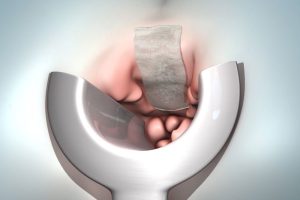
Surgery can be performed with a scalpel or through an electric pen or laser. This surgery is usually performed in the hospital, where you can often go home the same day without hospitalization.
In this process, devices with round heads are used to remove hemorrhoid tissue.
In some types of these surgeries, no incision is made. In this process, the hemorrhoids are raised and inserted into their original location, the anal canal, which is called hemorrhoidopexy stapler surgery.
Hemorrhoidectomy
Patients usually feel less pain after stapler hemorrhoidectomy compared to those who have performed traditional hemorrhoid surgery, but it is necessary to mention that the cost of this type of surgery is higher. In addition, for patients who are treated through this method, there is a higher probability of recurrence of hemorrhoids and surgery again.
Hemorrhoidectomy is also a procedure that uses a scope with a special rod to insert into the veins of the hemorrhoids, thus removing less tissue. Studies show that this type of surgery is less painful, but more studies are still needed in this field.
Recovery after hemorrhoidectomy
Recovery after this surgery takes about two to three weeks.
They will probably give you painkillers for 6 to 12 hours after the surgery.
If you don’t want to stay overnight in the hospital after surgery, you can go home after the anesthesia wears off.
Inability to urinate sometimes occurs due to tissue swelling or pelvic muscle spasm.
Care after hemorrhoidectomy surgery
You should expect some pain after surgery. If your doctor has prescribed a pain reliever, you should take it at the prescribed time and ask him about over-the-counter medications that are safe for you.
Bleeding after this surgery is normal; Especially after the first time you have a bowel movement after surgery.
Drink fluids and eat soft foods such as mashed rice, bananas, and toast for a few days after surgery, and then you can gradually return to your normal diet with more fiber.
Before and after defecation, you can use anesthetic drugs to relieve pain.
Applying ice compresses to the anal area can help reduce pain and swelling.
Sitting in warm water helps relieve pain and muscle spasms.
Some doctors recommend taking prescription antibiotics after surgery to prevent infection and reduce pain.
Some people recommend using stool softeners that contain fiber to make stools easier to pass, because the hardness of the stool may cause hemorrhoids to return.
Post-operative examinations and tests are usually done two to three weeks after surgery to check for problems.
Excretion after hemorrhoidectomy
When is this type of hemorrhoid surgery appropriate?
Hemorrhoidectomy is appropriate when you have the following conditions:
Very large internal hemorrhoids
Internal hemorrhoids that have caused symptoms but have not yet undergone surgery.
Large external hemorrhoids that cause discomfort and make it difficult to keep the area clean.
External and internal hemorrhoids.
Failure of other treatments for hemorrhoids.
What is the success rate and percentage of hemorrhoidectomy treatment?
Surgery usually cures hemorrhoids, but the long-term success of hemorrhoid surgery depends on how much you change your negative habits to prevent constipation.
On average, 5 out of every 100 people have hemorrhoids after surgery.
Complications and risks after hemorrhoidectomy
Pain, bleeding, and inability to urinate are among the side effects of hemorrhoidectomy, and other risks include the following:
Early problems after surgery
Bleeding from the anus
Accumulation of blood in the surgical area
Inability to control bowels or bladder
Surgical site infection
Stool stuck in the anal canal
Complications of hemorrhoid surgery (hemorrhoidectomy) in the long term
Narrowing of the anal canal
Recurrence of hemorrhoids
Abnormal problems such as fistulas that develop between the anus and the intestinal canal or other areas
Bowel prolapse
